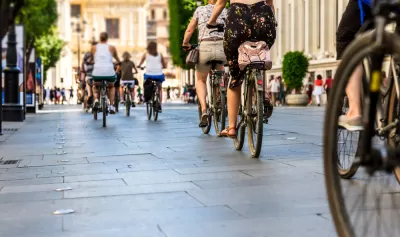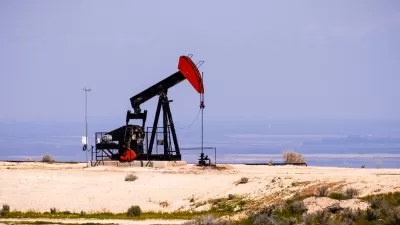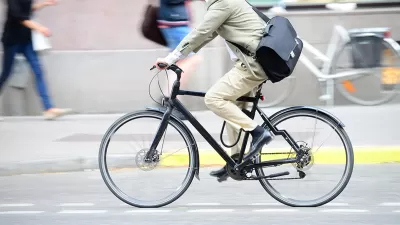Missing from the Democrats' Inflation Reduction Act, the significant climate legislation which passed the Senate on a 51-50 party-line vote on Sunday with Vice President Harris casting the tie-breaking vote, is any mention of bikes.

“The $369 billion climate package unveiled by Democrats last week is chock-full of subsidies for technologies meant to rein in planet-warming pollution,” writes Dino Grandoni, who covers energy and environmental policy for The Washington Post, on Aug. 2. The bill passed the Senate in a marathon vote over the weekend and now goes to the House.
But there’s one popular, emissions-free machine conspicuously absent from what could be the nation’s most significant piece of climate legislation yet: the bicycle.
The omission was not an oversight. It was deliberate.
“Provisions designed to supercharge the sale and use of traditional bikes and the battery-powered variety were dropped from the climate deal reached by Senate Majority Leader Charles E. Schumer (D-N.Y.) and Joe Manchin III (W.Va.), the Senate’s most conservative Democrat.
Dropped from the deal is a tax credit worth up to $900 to help cyclists purchase electric bikes. Also gone is a pretax benefit for commuters to help cover the cost of biking to work. Versions of both benefits were included in the roughly $2 trillion spending package that passed the House last year. [See Build Back Better].”
The tax credit for bike commuters, repealed by Republicans in 2017 in the Tax Cuts and Jobs Act, the benefit would have been similar to the tax savings offered to commuters who pay for transit or parking.
“I’m surprised that that didn’t make it in, because it just seems so common-sense,” said Caron Whitaker, the deputy executive director of the League of American Bicyclists, a cycling advocacy group.
David Zipper, a visiting fellow at the Harvard Kennedy School’s Taubman Center for State and Local Government where he examines the interplay between urban policy and new mobility technologies, told Alex Daugherty of POLITICO (in a July 28 piece included in the Debate, Criticism, Commentary section in the featured post on the legislation):
“We need people not just to shift from gasoline cars to electric cars. We need people to shift from cars, period. We can do that. But there’s nothing in this bill that makes that process easier or faster or more likely to happen.”
Hat tip to The Washington Post's Energy and Environment newsletter, Aug. 4.
Related posts:
- ‘Inflation Reduction Act’ a Mixed Bag for Climate Action, Planning Innovation, August 1, 2022
- Build Back Almost: Historic Legislation Falls One Vote Short, December 21, 2021
- Congressional Bill Would Offer a Bigger Tax Break for People Who Bike to Work, April 8, 2019
- Senate GOP Tax Cutters Target Bike Commuter Tax Benefit, November 27, 2017
- Harvard Report: Gas Taxes Not [Electric]Vehicle [Tax] Credits Necessary To Reduce Emissions, March 8, 2010
FULL STORY: Bikes get slighted in compromise climate deal

Trump Administration Could Effectively End Housing Voucher Program
Federal officials are eyeing major cuts to the Section 8 program that helps millions of low-income households pay rent.

Planetizen Federal Action Tracker
A weekly monitor of how Trump’s orders and actions are impacting planners and planning in America.

Ken Jennings Launches Transit Web Series
The Jeopardy champ wants you to ride public transit.

Washington Legislature Passes Rent Increase Cap
A bill that caps rent increases at 7 percent plus inflation is headed to the governor’s desk.

From Planning to Action: How LA County Is Rethinking Climate Resilience
Chief Sustainability Officer Rita Kampalath outlines the County’s shift from planning to implementation in its climate resilience efforts, emphasizing cross-departmental coordination, updated recovery strategies, and the need for flexible funding.

New Mexico Aging Department Commits to Helping Seniors Age ‘In Place’ and ‘Autonomously’ in New Draft Plan
As New Mexico’s population of seniors continues to grow, the state’s aging department is proposing expanded initiatives to help seniors maintain their autonomy while also supporting family caregivers.
Urban Design for Planners 1: Software Tools
This six-course series explores essential urban design concepts using open source software and equips planners with the tools they need to participate fully in the urban design process.
Planning for Universal Design
Learn the tools for implementing Universal Design in planning regulations.
Heyer Gruel & Associates PA
Ada County Highway District
Institute for Housing and Urban Development Studies (IHS)
City of Grandview
Harvard GSD Executive Education
Toledo-Lucas County Plan Commissions
Salt Lake City
NYU Wagner Graduate School of Public Service





























